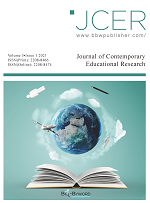Abstract
In recent years, with the high rate of juvenile delinquency, people pay more attention to the moral education of students in secondary vocational colleges. Based on the framework of social learning theory, this paper explores the systematic and comprehensive application of social learning theory in the moral education course. From the cognition of the behavior to the selection and internalization of the representation of the model behavior, and finally the selective externalization of the representation symbol to generate the behavior, the influencing factors and their utility in each stage of the production of moral behavior are analyzed step by step, assisting students to establish correct outlook on life and values, and cultivating their “key abilities.” When students face a complex and diverse social environment, they can make judgments in line with the general moral standards of the society, and then seek to improve the effectiveness of the moral standards of secondary vocational students, and strive to maximize the effectiveness of moral education.
References
Bandura A, 2001, Social Foundations of Thought and Action: Social Cognitive Theory (I). East China Normal University Press, (11): 5-30.
Zhang X, 2015, The Application of Bandura’s Social Learning Theory in Adolescent Moral Education. Loudoun University, 7-8.
Huang W, Han F, 2008, Bandura’s Process Theory of Observational Learning and Its Application to Model Education. Journal of Higher Correspondence Education (Philosophy and Social Sciences), (11): 51-78.
Luo X, 2008, A Study of Self-efficacy of Junior Middle School Students in Ideological and Moral Courses. Hangzhou Normal University, (6):14-5.
Shen L, 2011, On the Moral Development View of Bandura’s Social Learning Theory. Education Exploration, (1): 67-8.
He S, 2012, Bandura’s Theory of Social Learning Moral Education and Its Implications. New West, (14): 160-1.
Cheng D, 2015, Innovation of “Teaching-Doing Integration” Teaching Modern Higher Vocational Ideological and Political Courses. Journal of Teaching and Management, (02)36:36-39.
Xu H, Wu G, 2015, The Moral Value Exploration of Bandura’s Social Learning Theory. Peoples Tribune, (02): 208-10.
Ruan X, 2013, On the Cultivation of Students’ Critical Thinking Ability. Journal of Reading and Writing, 10(01): 56-7.
Wang J, Li Y, 2014, On the Improvement of Self-efficacy of Secondary Vocational Students. Journal of Vocational Education, (07): 38-9.
